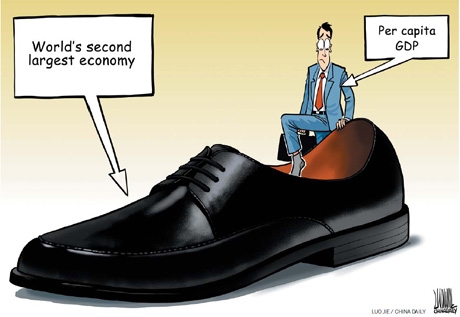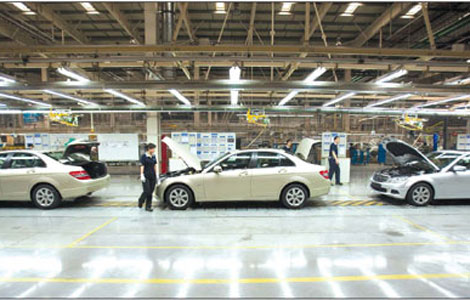Domestic development needs limit overseas role
Updated: 2011-02-18 10:27
By Qu Xing (China Daily European Weekly)
It is unfair to expect China to take on unrealistic international responsibilities
|
 |
Now China's GDP has surpassed Japan's to become the world's second largest economy, some Western media, which predicted that China was on the brink of collapse a short time ago, have begun to claim that China is no longer a developing country, and therefore should shoulder more international responsibilities.
China has never shunned its international duties. China bore great pressure in helping the world economy recover from the Asian financial crisis of 1997 and the international financial crisis of 2008 and China's huge debt reduction and development aid to African countries have received high praise from its recipients.
However, statistics from major international organizations indicate that China is still a developing country according to its current level of development and cannot accept "responsibilities" out of line with the country's level of development.
The United Nations Development Programme, which calculates a "human development index" for each country based on three indices - average life expectancy, education and living standards - ranked China 89th in 2010 and as a developing country with "a medium level of development".
The World Bank and IMF both rank China as a lower middle-income country.
China's industrial and employment structures and rate of urbanization are typical of a lower middle-income country. While China has made considerable progress in strengthening overall competitiveness, progress in modernization still lags significantly behind.
In the 2010 World Competitiveness Yearbook released by the International Institute for Management Development, China ranked 18th.
China has performed well in the development of the domestic economy, international trade, employment, public finance, the labor market and scientific infrastructure, but is not as competitive as it could be in terms of international investment, business legislation, management practice, health and environment.
Of the 12 indices examined in the Global Competitiveness Report 2009-2010 issued by the World Economic Forum, China ranked 79th in the world in the maturity of its science and technology.
China's technological innovation capability is poor. China's spending on research and development is far lower than that of the major developed countries and Chinese enterprises have few R&D facilities. The great majority of the patents for inventions in the area of high technology in China come from overseas.
China also spends much less on education than developed countries, has insufficient medium and high-level personnel and has a much lower overall level of human resources than developed countries and emerging industrial countries. The low proportion of China's population with a high school education has become a bottleneck in efforts to improve the quality of China's human resources. The average world level of spending on education is 4.9 percent of GDP and the level of most countries is generally not lower than 4 percent. According to the Chinese Academy of Social Sciences, actual investment in public education in China only accounts for 2.4 percent of its GDP.
The rapid development of China's economy in recent years has greatly increased the size of China's economy but it has also increased the gap between the rich and the poor. China's Gini Coefficient - a commonly used measure of wealth inequality - reached 0.47 in 2010, higher than those of developed countries such as France (0.327), Switzerland (0.337) and the United States (0.408). China has made great achievements in poverty alleviation in recent years, but there is still a great deal that needs to be done to help the poor.
During the 30-plus years of reform and opening-up, the country has moved into the front ranks of the world in terms of overall strength and its competitiveness in some fields. This is undoubtedly a great achievement. But most of the indices, such as those for economic and social development, education, health, science and technology, indicate that China is a developing country and still has much to do to.
China cannot accept responsibilities that would threaten its economic and social development.
The author is president of the China Institute of International Studies.
E-paper

Factory fever
Despite auto manufacturing bubble scare, car giants gear up expansion of factories.
Dressed for success
Fabric of change
High spirits
Specials

Earthquake Hits Japan
A massive 8.8 magnitude quake hit the northeast coast of Japan on March 11,2011.

NPC & CPPCC sessions
Lawmakers and political advisers gather in Beijing to discuss major issues.

Slide: Japan quake
Devastating earthquake and tsunami left millions without water, electricity, homes or heat.
